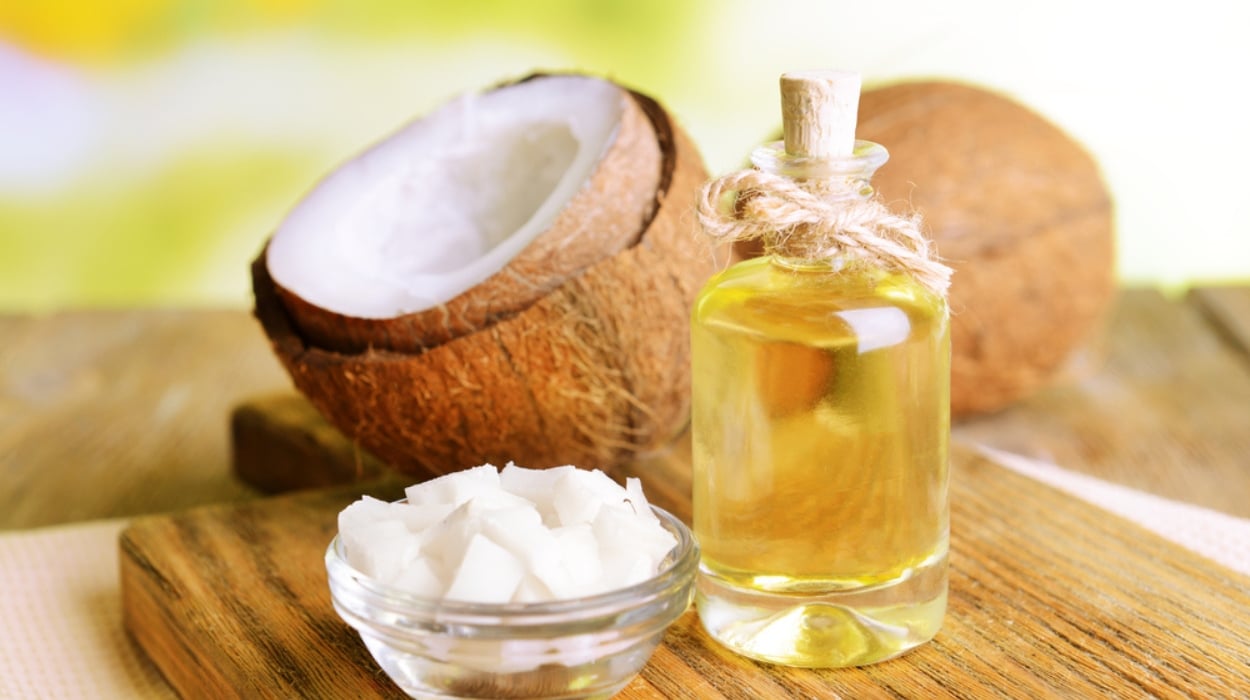Obesity is increasing at alarming rates and the World Health Organization estimates that more than one billion people are obese worldwide. As people around the world try to combat this epidemic, intermittent fasting is a diet trend that has sparked the interest of many.
Intermittent fasting is observing regular periods in which little to no calories are consumed. This can be broken down into many different forms and derivatives depending on your individual goal. Typically, intermittent fasting consists of a fasting period of 16 hours, followed by eight hours of normal calorie intake. However, the fasting period can consist of 24 hours (alternate day fasting), 12 hours, or fasting two days a week on non-consecutive days.
During the fasting period, drinking water, coffee, and tea are permitted, but the addition of sweeteners and creamers is not. What about coconut oil? Does adding coconut oil violate the rules of intermittent fasting?
Does Coconut Oil Break A Fast?
In the truest sense of intermittent fasting, yes, coconut oil will break a fast. But, consuming coconut oil will not kick you out of ketosis. This is because coconut oil is 100% fat, with up to 90% being saturated fats. Coconut oil can increase LDL (bad) cholesterol levels leading to an increased risk of heart attacks and strokes. Due to the minimal nutritional value of coconut oil, it should be used in moderation.
Will Coconut Oil Break Intermittent Fasting?
Yes. Without a doubt, consuming coconut oil will break a fast. During a fast, the number of calories one consumes is paramount to its success. In the most liberal of fasts, around 500 calories are allowed to be consumed, and one tablespoon of coconut oil takes up 25% of these precious calories.
Therefore, instead of wasting calories on coconut oil, which provides minimal health benefits, consume fruits and vegetables if your fast allows calories. These provide vitamins and minerals that are far healthier.
What Is Intermittent Fasting?
Intermittent fasting can be thought of as time restricted eating. These diets typically consist of a period where food can be consumed followed by an extended period of fasting, either 12, 16, or 24 hours. During the fast, your body enters a state of ketosis where it breaks down fats, rather than carbohydrates, into ketone bodies for energy.
The intake of carbohydrates or proteins can stimulate insulin secretion which can disrupt ketosis. Healthy fats do not break ketosis, but the calories associated with them will technically break the fasting period. A strict intermittent fasting diet requires a zero calorie fast. However, some diets will allow up to 25% of your daily calories during the fasting period (500 calories for a 2,000-calorie/day diet).
Intermittent fasting works to burn fat during states of ketosis which helps you lose weight. In addition to weight loss benefits, intermittent fasting has been shown to improve insulin sensitivity.[1] Insulin resistance is associated with an inflammatory state, which can lead to the development of cardiovascular disease and atherosclerosis (plaque buildup in arteries).
Intermittent fasting can help lower blood pressure[2] and improve cholesterol levels.[3] Intermittent fasting can be used to combat the epidemic of obesity and metabolic syndrome (obesity, high blood pressure, insulin resistance, and cholesterol abnormalities).
Fasting & Beverages
Beverages with zero calories are preferred during a fast. Black coffee, water, and tea are excellent options. However, be careful about adding sweeteners, cream, or milk to your beverage, as they will add calories and can break a fast.
The addition of coconut oil to coffee is popular among people on a keto diet, as it does not knock you out of ketosis whereas it will break a fast. Luckily, multiple beverages are safe to drink while fasting. However, if you wish to drink coconut oil, it is best to use it in moderation.
Nutritional Value Of Coconut Oil

One tablespoon of coconut oil contains 125 calories. This is mainly because coconut oil is composed of 100% fat with the majority (80–90%) of the fat being saturated fatty acids. One tablespoon of coconut oil contains 14 grams of fat with 12 of these grams being saturated fats.
Coconut oil contains no vitamins and minerals except for Vitamin E. Small amounts of plant sterols can also be found in coconut oil. However, the minimal amount of these substances in a few tablespoons of coconut oil is unlikely to be beneficial.
Medium Chain Fatty Acids & Coconut Oil
Lauric acid is the most common fatty acid contained in coconut oil and is a medium-chain fatty acid. Other medium-chain fatty acids are also present in coconut oil. The health benefits of medium-chain triglycerides have been well documented, however, these studies used a manufactured medium-chain triglyceride oil.
Coconut oil does not contain nearly the concentration of MCTs used in clinical trials. Consuming coconut oil to achieve the MCT dosage would be dangerous for your health. The high saturated fat content of coconut oil can raise LDL (bad) cholesterol leading to an increased risk of heart attacks and strokes. Instead, these MCT oils can be used.
Will Coconut Oil Break Ketosis?
Unlike a fast, coconut oil will not kick your body out of ketosis. Ketosis is the process by which your body uses fat as energy, breaking the fat down into ketone bodies. The targeting of fat helps one lose weight, which is the main goal of intermittent fasting.
A prolonged state of ketosis has shown beneficial effects on blood sugar levels, cardiovascular health, and weight loss. Because coconut oil does not contain any carbohydrates or protein, the body will remain in ketosis, using the fat in coconut oil as energy.
Should You Add Coconut Oil To Your Coffee?

Depending on your overall goals, adding coconut oil to black coffee is an option for a sugar-free substitute. Therefore, followers of the ketogenic diet can remain in ketosis while enjoying the added benefits of coffee. During a fast, however, it is best to avoid adding coconut oil to your morning coffee.
When adhering to an intermittent fasting diet, you do not have to avoid coconut or MCT oil completely. There are ways to consume these products that do not violate the fast.
Coconut oil[4] is high in saturated fats, which can increase the risk of heart attacks and strokes by raising LDL cholesterol. Thus overall, consuming healthier fats may be a better option than adding coconut oil, especially in people at risk of heart attacks or strokes.
The key is to consume coconut oil in moderation.
Conclusion
A diet utilizing intermittent fasting can help you lose weight, lower your blood pressure, and improve your cholesterol profile. The periods of fasting reduce insulin resistance and inflammatory processes occurring in the body. Breaking a fast happens anytime you consume calories during a fast. However, some types of intermittent fasting allow a small amount of calories, giving you a little leeway during the fast.
A diet including fasting can be difficult and thus using fats, such as coconut oil, can be used to reduce hunger and improve compliance. Coconut oil in coffee is a common recommendation but does not come without drawbacks.
Technically, adding coconut oil to coffee will break a fast However the use of coconut oil maintains ketosis which is one of the beneficial factors of fasting. Unfortunately, coconut oil lacks vitamins and minerals and can raise LDL cholesterol levels. Thus, if you use coconut oil, limit the amount you use and consider other options when deciding on additives for your coffee.
Frequently Asked Questions
Intermittent fasting is defined as the consumption of zero calories during a predetermined time followed by the resumption of eating.
Coconut oil will break a fast by providing calories to the body while intermittent fasting.
This may be useful when starting this diet to help satisfy hunger during a fast. However, due to the high saturated fat content, healthier options such as fruits and vegetables should be used instead.
 Expert's opinion
Expert's opinion
